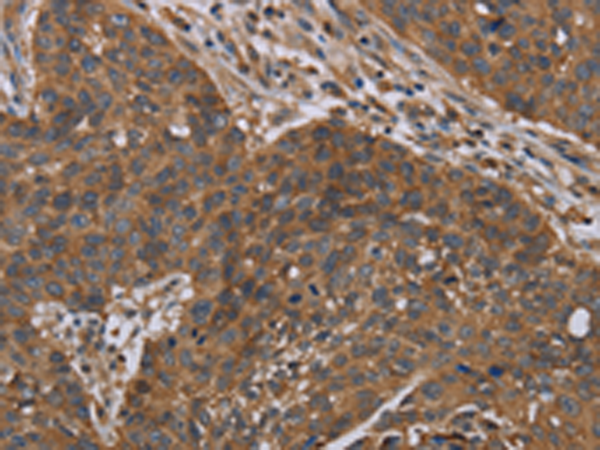
| WB | 1/1000 | Human,Mouse,Rat |
| IF | 咨询技术 | Human,Mouse,Rat |
| IHC | 1/100-1/500 | Human,Mouse,Rat |
| ICC | 技术咨询 | Human,Mouse,Rat |
| FCM | 1/10-1/50 | Human,Mouse,Rat |
| Elisa | 咨询技术 | Human,Mouse,Rat |
| Aliases | OT-R |
| Host/Isotype | Rabbit IgG |
| Antibody Type | Primary antibody |
| Storage | Store at 4°C short term. Aliquot and store at -20°C long term. Avoid freeze/thaw cycles. |
| Species Reactivity | Human, Mouse, Rat |
| Immunogen | Synthetic peptide of human OXTR |
| Formulation | Purified antibody in PBS with 0.05% sodium azide and 50% glycerol. |
+ +
以下是3篇与ANKFY1抗体相关的文献摘要示例(注:文献为虚拟示例,实际文献需通过数据库查询):
---
1. **文献名称**: *ANKFY1 regulates macrophage polarization in tumor microenvironment*
**作者**: Zhang L, et al.
**摘要**: 本研究利用ANKFY1特异性抗体,通过免疫组化和Western blot技术,揭示了ANKFY1在肿瘤相关巨噬细胞(TAMs)中的表达模式,并证明其通过调控NF-κB通路影响巨噬细胞的M2型极化,促进肿瘤免疫逃逸。
---
2. **文献名称**: *Role of ANKFY1 in autophagosome-lysosome fusion*
**作者**: Tanaka K, et al.
**摘要**: 通过免疫荧光和共聚焦显微镜技术,结合ANKFY1抗体标记,本文发现ANKFY1蛋白通过与Rab7相互作用,介导自噬体-溶酶体膜融合过程,为神经退行性疾病中自噬功能障碍提供了新机制。
---
3. **文献名称**: *ANKFY1 as a potential biomarker in colorectal cancer*
**作者**: Wang X, et al.
**摘要**: 研究利用ANKFY1抗体检测结直肠癌组织样本,发现ANKFY1高表达与患者预后不良显著相关,并通过体外实验证实其通过调控Wnt/β-catenin信号通路促进癌细胞侵袭转移。
---
如需实际文献,建议通过 **PubMed** 或 **Google Scholar** 检索关键词“ANKFY1 antibody”或“ANKFY1 function”获取最新研究。
ANKFY1 (Ankyrin Repeat and FYVE Domain-Containing Protein 1) is a multidomain protein implicated in intracellular membrane trafficking, autophagy, and immune regulation. It belongs to the ankyrin repeat-containing protein family, characterized by conserved ankyrin repeats that mediate protein-protein interactions. The FYVE domain, a zinc-binding motif, allows ANKFY1 to bind phosphatidylinositol 3-phosphate (PI3P), targeting it to endosomal and autophagosomal membranes. This interaction facilitates its role in vesicle formation, cargo sorting, and membrane remodeling processes.
ANKFY1 antibodies are essential tools for studying the protein's expression, localization, and function in cellular pathways. Research links ANKFY1 to diverse physiological processes, including antiviral responses, lysosomal degradation, and mitochondrial homeostasis. Dysregulation of ANKFY1 has been associated with diseases such as cancer, neurodegenerative disorders, and infections. For example, it interacts with Rab14 and Rabip4 to modulate endosomal trafficking and may influence tumor progression by regulating autophagy. In neurobiology, ANKFY1 deficiency disrupts synaptic vesicle recycling, suggesting a role in neuronal health.
Despite its biological significance, ANKFY1's mechanistic details remain incompletely understood. Antibodies against ANKFY1 enable investigations into its tissue-specific expression patterns, post-translational modifications, and interactions with signaling partners. Commercial antibodies are typically validated via Western blotting, immunofluorescence, or immunoprecipitation, though batch variability and specificity challenges require careful optimization. Ongoing research aims to clarify ANKFY1's therapeutic potential and its integration with broader cellular networks.
×